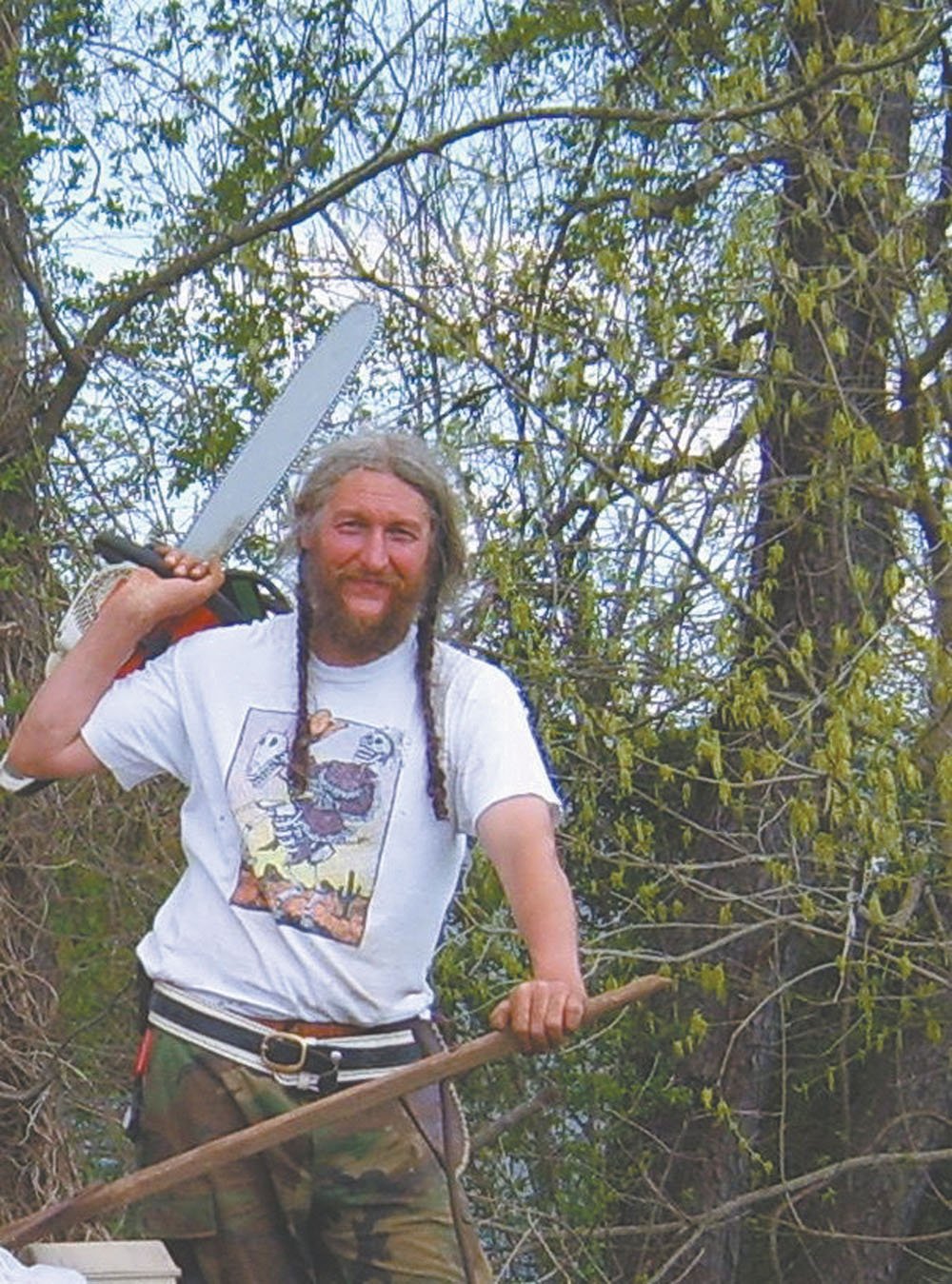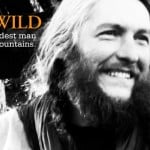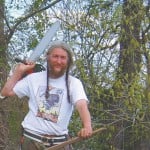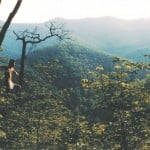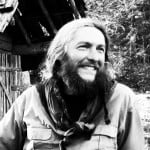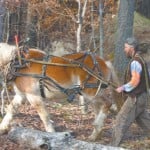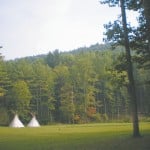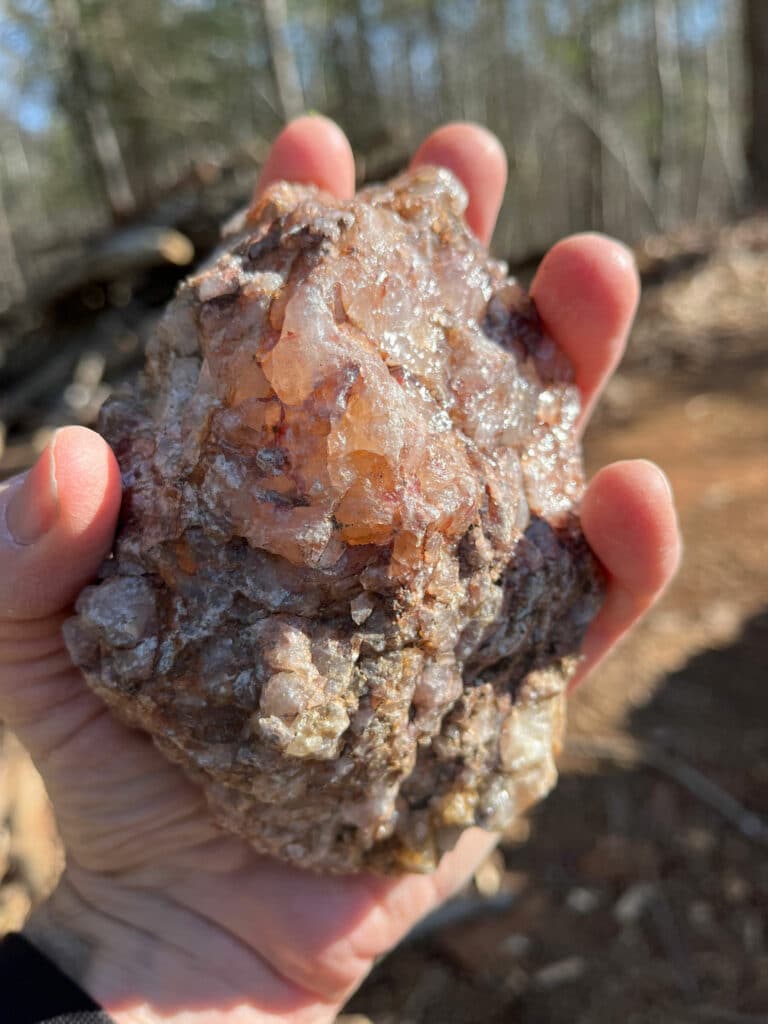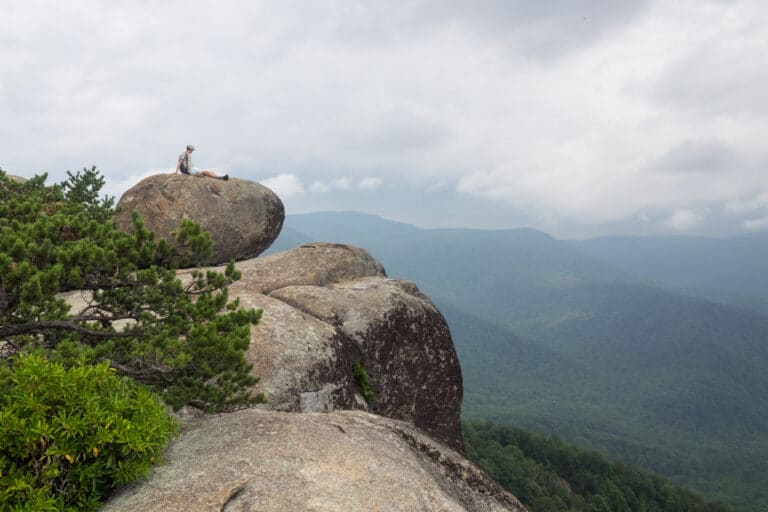He lives off the land, starts fires by rubbing sticks together, and dresses in the skins of animals he has eaten. He thru-hiked the Appalachian Trail wearing a loincloth for most of the trek, and survived almost exclusively by what he hunted and gathered.
He rode across the country on horseback in 103 days, setting a world record. He isn’t a fairy-tale fictional character. Eustace Conway is for real.
In fact, he is one of the most real human beings alive today. While most of us spend our time in front of computer screens dawdling in virtual reality, Eustace Conway lives in direct, physical contact with the natural world.
He has immersed himself in nature since he was four years old, roaming the woods behind his suburban house near Gastonia, N.C. At age 10, he purposefully walked deep into a nearby forest, alone and empty-handed, and survived off the land for a week. After high school, Eustace canoed down the Mississippi River and kayaked across Alaska, honing his backcountry skills. Later he lived with primitive indigenous tribes in Guatemala. When he returned to the Blue Ridge in his early twenties to attend Appalachian State University, he lived in a handmade tipi, cooked squirrels over a fire, and wrote papers by candlelight.
Soon after graduating with honors (majoring in anthropology and English), Eustace found the wildest, most rugged land in Appalachia—a 1,000-acre chunk of mountain near Boone, N.C., and gradually bought parcels of it. To pay for the land that he now calls Turtle Island Preserve, he spent years traveling the country on speaking tours teaching primitive skills and revealing the natural economy hidden behind dollar bills—like where food and water comes from, where waste goes, and how clothes are made.
For the past two decades, Eustace has lived self-sufficiently at Turtle Island, growing his own vegetables and raising goats and chickens. He built a log cabin using trees from the property, and it is powered by an off-grid micro-hydroelectric system along a creek. He travels primarily by horse, occasionally riding into crowded downtown Boone on horseback to get supplies. To make ends meet, he offers educational enrichment camps for youths, adults, and organizations, as well as horse-drawn carriage rides through the deep, lush woods of Turtle Island.
Eustace is the subject of Elizabeth Gilbert’s 2002 bestselling biography, The Last American Man. The book brought him even more national recognition and even a few movie offers from Hollywood.
But the book also revealed Eustace’s intense personal struggles in living out his pioneering vision. Eustace’s rigorous personal discipline has often prevented him from maintaining lasting relationships. Dozens of women have passed in and out of his life, frustrated by his high expectations. Their romantic notions of Eustace collide with the harsh realities of a self-reliant, traditional life: long hours of manual labor, bland food, blistered hands, frozen toes, swarming bugs, and, most of all, loneliness.
Countless students hoping to follow in Eustace’s worn boot steps have expressed similar frustrations. They arrive at Turtle Island starry-eyed and dizzy at the prospect of working alongside this idolized, modern-day Davy Crockett. But after a few weeks or a few days (or in some cases, a few hours) of hauling manure and splitting firewood, they leave, complaining about Eustace’s exacting discipline and harsh, condescending attitude.
These days, however, the 47-year-old mountain man seems strikingly different than the book’s portrayal of him. Several interns have graduated after a year or more of service, and his partner, Desere, has lived with him for almost three years—one of his longest relationships.
His work ethic is as punishing and unrelenting as ever, but his friends say that it is tempered with a softer, gentler approach to his relationships. He is interested in starting a family, and after years of focus on perfecting Turtle Island, he once again is venturing out into the maddening world to “reach, preach, and teach” the gospel of simple, natural living.
BRO: How did you gain the skills to live self-reliantly in the woods?
EC: I learn things by doing them. And I am an astute learner who can focus intensely. Most modern, overstimulated Americans lack the ability to hone in and focus. The key to learning is to pay attention—complete attention—to the lessons of the moment.
For example, when I am hunting in the woods, for hours at a time, I am watching every color and shade of the forest, constantly monitoring the wind direction, listening to every leaf. It’s absolute, complete presence in the moment. I’m totally tuned in to the sensory world.
BRO: Why did you come back to the Appalachians to live?
EC: I think the Appalachians are one of the finest places on the planet to live. They have the greatest biodiversity of flora and fauna. They also are home to some of the most knowledgeable and skilled people.
The physical barriers of the Appalachians slowed the breakdown of traditional culture, so that mountain folk still know the old lore in the Appalachians. I treasure talking to them, learning from them, being blessed by their presence.
When all of my peers and my whole generation was leaving the rural life behind for careers in the city, I was going in the opposite direction. I was absolutely dead-set on learning the skills from the old-timers before they were gone. I absorbed every scrap of knowledge that the old-timers could provide. So that now, at a relatively young age, I am a storehouse of lore and hands-on experience—how to track a bee to find its honey tree, how to castrate a goat with a pocket knife—skills that are now very rare.
BRO: What’s the best way for beginners to learn basic outdoor skills?
EC: The best way to understand nature is to be involved with it—touch it, smell it, be moved by it physically, emotionally, spiritually.
A woman visiting Turtle Island this past winter was wearing only a thin black jacket. After a few minutes of shivering, she asked me, ‘How do you stay warm out here?’ I replied, ‘Learn how to dress. Here’s a rule that works 100% of the time: Wear a lot of layers. Go outside overdressed, and when you get hot, take one layer off. Your culture teaches you fashion, but it does not teach you how to dress warmly and wisely.’
Each of us has a body. We’re in it all the time, and we don’t even know how it works. Learn about circulation, body temperature, the basics of how your body functions. Start with the fundamentals. Set aside time each day to get outdoors and observe what’s happening around you—and within you.
BRO: Where should people begin their outdoor education?
EC: Start by learning where your food, water, clothing, and shelter comes from. And begin to pay attention to how things work. But do it gradually. If you’ve never done construction, don’t try to build your own house. Build a doghouse first.
I’m not trying to rip off a man’s button-down shirt and put him in a loincloth. I meet people where they are and gradually try to teach the skills they need.
Sink your feet down into reality. We’re so out of touch that we don’t know where our clothes come from, how a sewing machine works, how to thread a needle. I learned how to sew when I was four years old. I can knot a thread at the end of the needle without looking. I have that skill because I did it, with these hands. I didn’t watch someone making a dress on television.
Grow some food. You don’t need a big farm. Grow five radishes. Eat those five radishes. It seems like such a small step, but taking the small step is the big step, because the first small steps will lead to others that move and motivate you. You’ll want not just the radishes but the whole salad, so next time you’ll plant lettuce and a few onions and tomatoes as well.
BRO: Is Turtle Island completely self-sufficient?
EC: No, and self-sufficiency is not the primary goal here, although we’re a lot closer to self-sustainability than most. We do a lot of things, and we have to decide what’s most important. For example, I want to have and use horses, but I don’t have enough open pasture, so I have to buy hay. We use fuel for vehicles, and we even have some store-bought food. We make some allowances, and I’m not crying over it.
Once, some folks saw me using a chainsaw to cut wood and said, ‘You’re cheating!’ I’m not cheating. This is not a game. This is how I cut my firewood to heat my home. This is not a pristine, completely primitive existence where you would break your firewood with a rock. But I really am heating and cooking with firewood and have been for 30 years, and a chainsaw works really well for me. I have cross-cut saws and axes, so when the chainsaw fuel is no longer flowing, I’ll be all right. But while we have the chainsaw and the fuel, I’m happy to use it.
BRO: Will Americans ever be willing to give up their conveniences for a more primitive life?
EC: I think there will be a blending of traditional ways and modern technologies. I don’t think people will give up many of their conveniences willingly.
For example, I gave up electricity and went 30 years without it, and tried to get a lot a people to do the same. Countless people have come to Turtle Island, camped out, and got a feel for what life without electricity is like. But I don’t think a single one of them decided to give up electricity. So I backed up and said, ‘I’ll show them how to make electricity that’s not so detrimental.’ I installed a small hydroelectric system on a creek here, and already several visitors have seen my system and decided to install their own.
BRO: Do you ever aspire to be politically active in environmental causes?
EC: So much of it seems dysfunctional. I haven’t gotten political so far. I’ve found a niche at Turtle Island that I’m working in right now, and you need a certain focus to do anything well. But I lectured recently at Columbia University, and some students asked me, ‘What can I do?’ I replied, ‘If I were you, I would get radical. Get crazy. Get active.’
BRO: What are your spiritual beliefs?
EC: There are many faces of humanity, many voices and beliefs, and many belief systems that I respect and honor, as long as they are helping to promote good—which is close to the word ‘God’—as long as they are making the world good and enriching our lives. I personally find the greatest source of goodness and God-ness in the gifts of the natural world.
BRO: How do you keep your spirituality alive?
EC: This morning, I was atop the mountain watching the sun rise. I bowed to the sun and gave thanks for the rays of life, the renewal we have each day. That’s prayer to me. That mountaintop was my church.
It’s just natural to value the sun. When you feel the sun’s warmth on a cold morning, you can’t help but be grateful. But the problem is that people don’t watch the sunrise. They don’t feel the sun on their skin. They go from their house to the car to the office cubicle—box to box to box—without experiencing the natural world. As a result, they lack gratitude for the sustenance that the natural world provides them.
Gratitude is the foundation of all religions. A big piece of our cultural demise is our lack of gratitude. If your elders and life experiences don’t teach you gratitude, it’s hard to develop a deep spiritual root. Children today are raised expecting instant gratification. They expect the world to cater to them.
BRO: Was there anything about how Elizabeth Gilbert presented you in The Last American Man that you’d like to change?
EC: From the beginning, we had an agreement that I would not change, edit, or influence any part of the book. Basically she asked me a lot of questions and I told her everything. I didn’t even know what she was going to be writing. It was complete trust. She listened to my story and then chose what to pull out and extrapolate and share with people. I was the subject, but it was her story.
BRO: How could Elizabeth get the whole picture?
EC: For starters, she’s a woman writing about a man and masculinity—not that she could not overcome that limitation, but for her to recognize that limitation would have been important.
I think there could have been so much more depth to the book, but she accomplished what she wanted to do: she knocked out an entertaining book and got it out there for people to read. I respect her accomplishment as an artist.
BRO: What is your long-term vision for your life’s work?
EC: I’d like to start a charter school at Turtle Island, and I’d like for Turtle Island Preserve to be a model that’s replicated in other places. But I’m limited by time and financial resources. All of my world records and epic adventures do not compare to the challenge of keeping Turtle Island Preserve running on an almost-no-money budget. I don’t have any income other than what people pay for camps or buggy rides.
I have other visions and adventures dreamed up—riding across New Zealand, a buggy trip to Saskatchewan with some friends, a 1,000-mile horse trip along the Mississippi River—but most important to me right now is getting Turtle Island Preserve sustained for the future, to be able to go on without me. One way I’d like for that to happen is by starting a family, but most important is that Turtle Island continues beyond me.
I mostly want to help people, possibly through writing or consulting to help other people and organizations establish educational enrichment bases like Turtle Island.
BRO: What is the biggest problem facing our world today?
EC: Overconsumption. We’re fat—not just physically obese, but the blubber of our materialistic lives keeps us from being grounded in reality. It’s also causing the disintegration of our culture. Without contact with the natural world, we’re cut off from our cultural and spiritual roots. •
